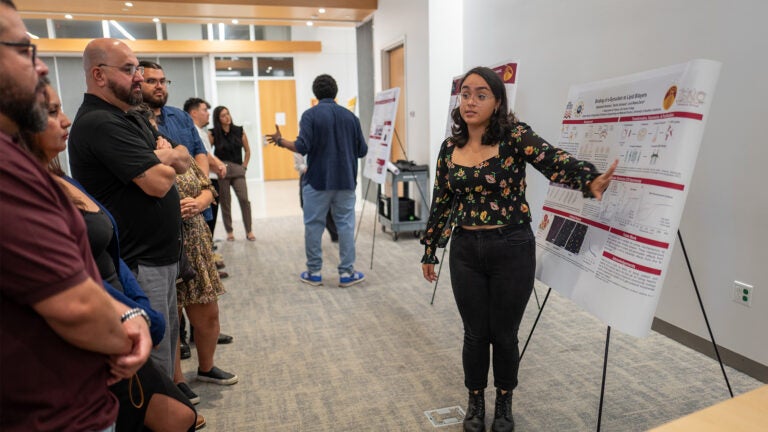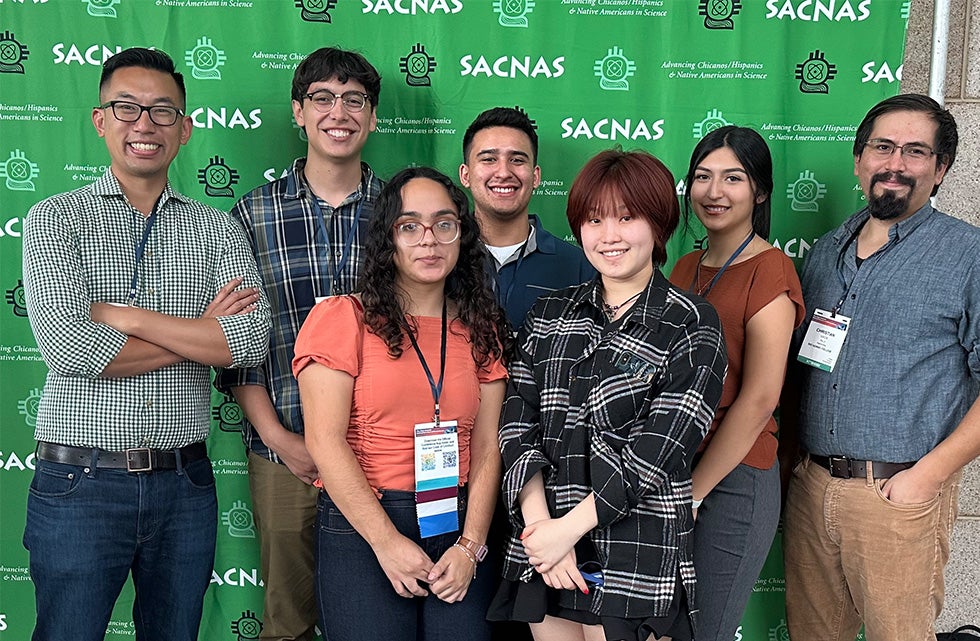
Women and Hispanic community college students climb aboard USC’s TRAINS Program
Stephanie Ramirez’s fascination with science and math began in elementary school. She maintained that sense of wonder in high school when girls typically gravitate away from science, technology, engineering and math (STEM fields). And she remained unfazed while a student at Rio Hondo Community College, despite the male-dominated atmosphere in her STEM courses.
Rather than feeling discouraged, she has always felt motivated to dive deeper into her studies as one of just a few women in her STEM class and a first-generation college student.
“It drives me because I want to be the person who changes the future for me and my family,” she said.
Ramirez is bucking the odds. According to a 2018 report by Microsoft Philanthropies, 40% of high school-aged girls lose interest in pursuing a career in STEM, and that number jumps to 58% beginning in college. The reasons vary, but gender expectations, a male-dominated culture and limited women role models loom large as discouraging factors.
Dreams do come true
Despite her strong desire to pursue STEM studies, when it was time to apply to college, the prospect of attending a four-year institution presented financial obstacles that seemed insurmountable for Ramirez. Community college was her only option, so she chose Rio Hondo, which was close to her home.

While there, she worked part-time as a tutor while her single mother cleaned houses in Los Angeles to make ends meet.
Stephanie’s journey, as a Hispanic woman aspiring to establish a career in STEM, took a fortunate turn when she came across flyers posted at Rio Hondo advertising USC’s Transitions and Research Across INterfaceS program (TRAINS).
The brainchild of Peter Chung, assistant professor of physics and astronomy and chemistry at USC Dornsife College of Letters, Arts and Sciences, and his counterpart at Rio Hondo, Chris Vaca, TRAINS aims to recruit students from critically underserved communities, like Ramirez, into STEM fields.
Chung and Vaca emphasized the pivotal role community colleges can play in rectifying the underrepresentation of Latinos and women in STEM fields. Compelling statistics support their argument.
According to a Rio Hondo report, 398 students enrolled at the college in the 2017–18 academic year declared STEM majors. Nearly 92% of those students identified as Hispanic. However, less than 5% of them, a mere 19 students, finished with a STEM degree within four years and only a third remained enrolled in college at the end of their fourth year.
Labs are key
According to Chung, this decline can be attributed to the absence of hands-on research experience. He contends that engaging students in laboratory work is essential for sustaining their interest in STEM disciplines.
“Without daily lab experiences and mentorship, students’ STEM interest dwindles significantly,” he said.
Through TRAINS, now in its second year, Chung wants to counter that trend by offering community college students an opportunity to work in a research lab at USC.
A collaboration between USC, Rio Hondo and the University of California, Santa Barbara Center for Science and Engineering Partnerships, TRAINS is funded by a $1 million, five-year grant from the National Science Foundation’s Division of Equity for Excellence in STEM.
The hands-on lab experience and mentorship program also provide each student with a $10,000 stipend over their 15-month participation in the program. Mentors, typically PhD students or post-docs, receive a $2,000 stipend per cycle.
For Ramirez, being paid to conduct research in biophysics and biological engineering under faculty mentors at USC enables her to transition from Rio Hondo to USC Dornsife. As a new transfer student majoring in biological sciences, her long-held dream of becoming a dentist is now within reach.
Easing transition shock
TRAINS eased the transition with a “transfer shock” seminar, a weekly meeting during the summer program. The seminar is designed to equip students for upper-division courses while balancing research commitments.
Ramirez, now a research assistant in the laboratory of Wade Zeno, assistant professor of chemical engineering and materials science at USC Viterbi School of Engineering, feels well-prepared and confident. Her next goal is to foster a sense of community and establish study groups within her classes.
Future goals for the program
This summer’s TRAINS cohort hosted 12 students. Next summer, Chung plans to add two more for a total of 14. His goal is to expand TRAINS beyond Rio Hondo, the program’s pioneer community college, by enrolling students from other Los Angeles community colleges. With effort and perhaps a little luck, he’ll soon welcome students from El Camino College and East L.A. College.